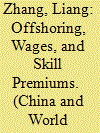| Srl | Item |
| 1 |
ID:
077670


|
|
|
|
|
| Publication |
2007.
|
| Summary/Abstract |
The failure of Japanese electronics firms to participate fully in the Internet-fueled growth of the global electronics industry during the late 1990s triggered a period of questioning among top executives. This article examines Japanese managerial responses to the organizational model "value chain modularity," which was deployed by the US electronics firms driving the creation of the Internet. While there were partial but significant steps taken in the direction of this new US model-increased specialization, outsourcing of low-end products, and shared factory investments in Japan -wholesale restructuring was resisted. This evidence is consistent with larger patterns of gradual institutional change in Japan . I argue that the result of this process will likely be increased, not diminished, institutional diversity over time. While globalization has accelerated the pace of change by opening new avenues for organizational experimentation and institutional layering, the drag on organizational change exerted by existing institutions slows the process enough to allow institutional and organizational innovations to develop into coherent systems with distinct characteristics. The result, inevitably, will be a uniquely Japanese approach to the challenges posed by globalization.
|
|
|
|
|
|
|
|
|
|
|
|
|
|
|
|
| 2 |
ID:
101100


|
|
|
|
|
| Publication |
2010.
|
| Summary/Abstract |
Studies on industrial clustering identify factors that nourish the clustering and thus aid in industrial development. We classify these as government incentives and economic fundamentals. Economic fundamentals, which we define as a set of essential factors conducive to the development of an industry cluster, may be the result of chance - for instance, geographical location and climate or may be a result of long term government policies such as affordable and abundant higher education. We examine the importance of government incentives relative to the economic fundamentals in the development of the software services industry in Thailand. Our survey of investors, both foreign and domestic, in the software services industry in Thailand, found that economic fundamentals were perceived as being more important than government incentives in influencing investment decisions. This raises important questions for government policy. For example, is money used for tax breaksand grants efficiently spent? Or, could the money be better invested in improving the quality of human resources and infrastructure? Based on the findings of this study, recommendations are proposed for government policy and directions for future research.
|
|
|
|
|
|
|
|
|
|
|
|
|
|
|
|
| 3 |
ID:
181614


|
|
|
|
|
| Summary/Abstract |
Using detailed Chinese manufacturing firm production and trade data from 2000 to 2006, this study finds that offshoring significantly increases firms’ average wages. First, using the quasi-natural experiment of China's accession to the World Trade Organization, we investigate how a reduction in offshoring costs affects the manufacturing firm's wages and find that a productivity effect and a job-relocation effect are two possible channels. Second, the dynamic decomposition of industry-level wages indicates that the within-firm effect is 0.547, accounting for 31.5 percent of the total variation. Finally, a Mincer-type regression shows that offshoring also increases within-firm skill premiums. Our findings have strong implications for the government related to framing appropriate industrial policies to raise wages and reduce income inequality.
|
|
|
|
|
|
|
|
|
|
|
|
|
|
|
|